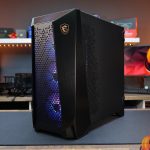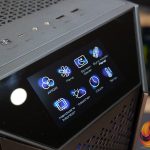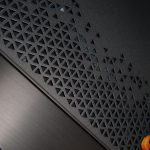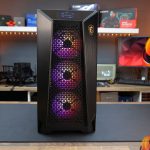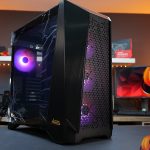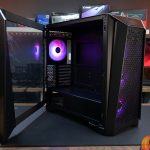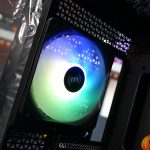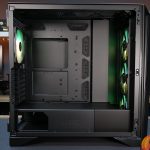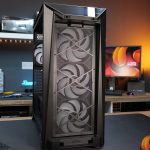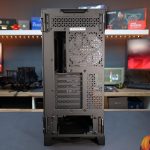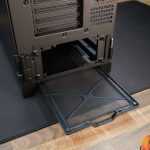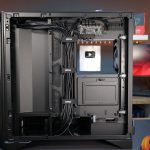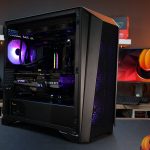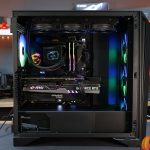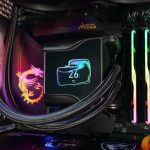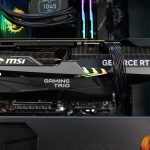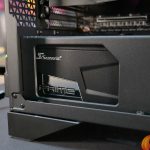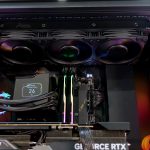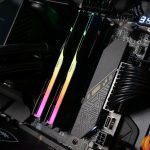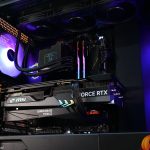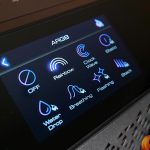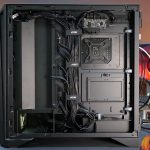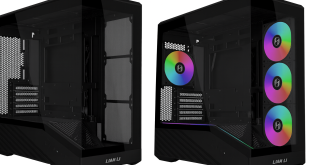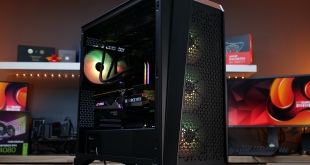
LCD screens on cases and coolers have become ever more popular recently, but the MSI MEG Prospect 700R has the most feature-rich LCD screen that I have seen to date. The MEG Prospect 700R is a large mid-tower ATX chassis with enough space to house the latest graphics cards, EATX motherboards and extensive cooling options. Its equipped with a front-mounted 4.3-inch touchscreen LCD panel that can display system information, control fan speed, adjust RGB lighting effects and integrations with MSI Centre… But does all this high-tech gadgetry make it a good case? Let's take a look.
Timestamps:
00:00 Start
00:56 It’s how much?
01:54 Touchscreen LCD panel
02:51 A lot of features
04:20 Front panel I/O
04:54 Analysing the case – deep dive
09:30 Hardware support (GPU/CPU)
09:54 PCIe / Vertical GPU mount (supplied)
10:12 PSU shroud / colour matching
11:20 Rear panel and spacing
12:36 Behind the tray
13:45 Storage support
14:57 Bottom of the case
15:48 Hardware for the build
18:12 System build – Timelapse
24:14 James thoughts on the build process
26:57 Thermal and Noise Performance
28:24 Closing Thoughts – Pros and Cons
LCD screens are becoming very popular on PC cases these days. Just like AIOs clad with LCD displays, every vendor now wants a chassis with a screen. Most manufacturers have utilised the LCD screen as a way to display system information and allow users to personalise the system with custom images and animated GIFs. MSI has taken that one step further by introducing the MEG Prospect 700R with a 4.3-inch touchscreen display that has many useful functions.
As well as being able to display system info, custom images and GIFs, the touchscreen display on the Prospect 700R can be used to control fan speed, adjust ARGB lighting effects with a few taps on the screen, it can also integrate with MSI Centre to display weather reports and more. Control can be completely handed to MSI Centre or the motherboard too. This innovative design means that the price of the case isn’t cheap but if you have a healthy budget and want this feature it can be yours for around £350.
Features:
- The front of the case is equipped with a 4.3-inch touchscreen LCD panel that can control fan speed and ARGB lighting effects as well as display system information, weather reports and more. The panel can also be synchronised with MSI Centre or motherboards to control features.
- Equipped with four pre-installed 140mm MSI ARGB fans for optimal cooling and vivid lighting effects. Fan speed and ARGB lighting can be controlled by the touchscreen LCD display or synchronised with MSI Centre.
- A modular interior allows users to alter the system according to their specific needs. The side mount panel can be swapped from the default cable management panel to a fan/rad mount panel mount or an adaptor plate for large EATX format motherboard installation.
- A spacious interior supports up to EATX motherboards, large graphics cards up to 400mm long, tall CPU coolers and big power supplies. Dedicated cable routing channels and hinged side panels provide great accessibility for installation.
- Magnetic dust filters are located on the top, front, side and bottom panels of the case to minimise unwanted dust build-up.
- Extensive cooling options include multiple large radiator installations, support for up to ten 120mm fans, optimised airflow via ventilated panels and an EK distro plate that can be purchased separately is available for custom cooling enthusiasts.
- Front I/O connectivity features two USB 3.2 Gen 1 Type-A ports, a single USB 3.2 Gen2 Type-C port, 2 x 3.5mm audio jacks as well as power and reset buttons.
MSI MEG Prospect 700R Specifications:
- Case Form Factor: Mid-Tower
- Supported Motherboards: EATX (up to 310mmx304.8mm) / ATX / M-ATX / ITX
- Front I/O Ports: 2x USB 3.2 Gen 1 Type-A, 1x USB 3.2 Gen 2×2 Type-C, 1x HD Audio, 1x Mic
- Storage Drive Support: 2x 2.5”, 2x 2.5″/3.5”
- Expansion Slots: 7
- Maximum GPU Length: 400mm
- Maximum CPU Cooler Height: 185mm
- Supported Power Supply: Standard ATX, max up to 220mm (without 3.5” HDD tray installed)
- Supported Fans: 3x120mm/3×140 mm (Front), 3×12 mm/3x140mm (Top), 1x120mm/1x140mm (Rear), 3x120mm (Side)
- Pre-Installed Fans: 3x140mm ARGB (Front), 1x140mm ARGB (Side)
- Radiator Support: 120/140/240/280/360mm (Front), 120/140/240/280/360mm (Top), 120/140mm (Rear), 120/240/360mm (side)
- Dimensions (DXWXH): 585x257x537mm
- Net Weight: 15.95 kg
- Note: Material – Left Side: Tempered Glass/ Right Side- Metal, Vertical GPU Mount – Yes, Touch Panel – Yes
Thermal Performance Testing
To simulate thermal demand we run the Cinebench R23 multi-thread benchmark and 3DMark Speed Way stress test simultaneously in a loop for 60 minutes to fully load the system. This gives the CPU and GPU enough time to reach constant steady-state temperature. With this data, we can compare how the system handles the thermal demand and measure peak noise levels.
Thermal performance is measured with the case in various configurations, such as the default, with the tempered glass left-hand side panel removed and with the front panel removed to see how these configurations affect the CPU and GPU temperature. During testing, only stock case fans are used unless otherwise specified. All water pumps are set to maximum RPM and fans are set to a custom RPM curve by the Motherboard software/BIOS.
All temperature measurements are presented as Deltas – meaning the ambient temperature has been deducted from the CPU temperature giving us a Delta. Data shown in the charts represent the average component temperature over the length of the test as measured by HWiNFO and then the last 15 minutes of the data are calculated to get the average. The ambient temperature during thermal tests is between 19-21⁰C.
Test System Specification:
- CPU – Intel Core i9-13900K
- Motherboard – MSI MEG Z790 ACE
- Graphics Card – MSI RTX 4080 Gaming X Trio
- Memory – 32GB ( 2 x 16GB Modules) GSKILL Trident Z5 DDR5-6400
- Storage – 2TB Seagate FireCuda 530 PCIe Gen 4 M.2 NVMe SSD
- CPU Cooler – MSI MEG CORELIQUID S360 360mm AIO
- Power Supply – Seasonic PRIME TX-1600 1600W 80+ Titanium ATX 3.0/PCIe 5.0
- Case fans – Stock
- Chassis – MSI MEG Prospect 700R
- Operating System – Windows 11
Thermal Performance/Noise Overview:
Thermal Performance:
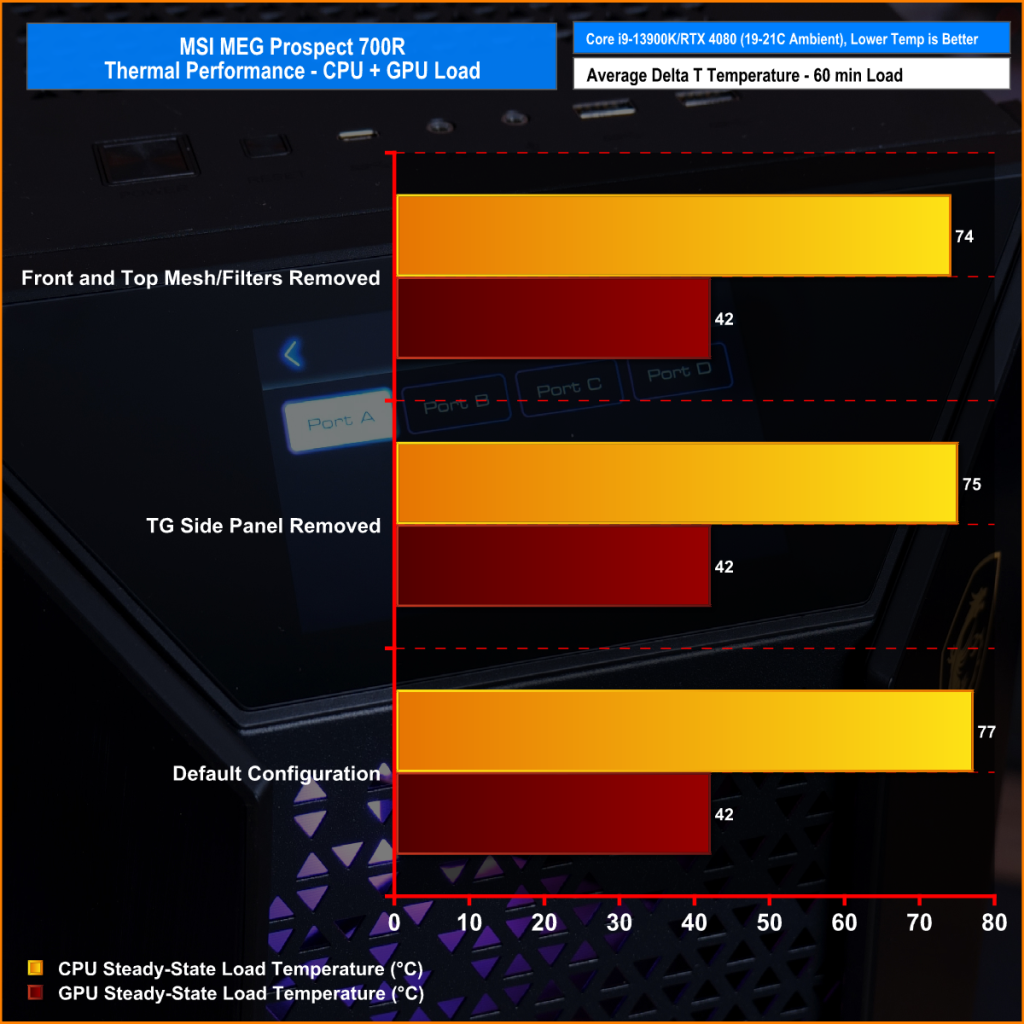
With the system under full load, the MSI MEG Prospect 700R copes well with thermal demand. 77 °C delta is normal for the Core i9-13900K CPU and the GPU temperature at 42°C delta is great for the RTX 4080, which means the airflow is working well through the case.
Removing the side panel didn’t have much of an impact on either the CPU or GPU temperature but removing the top and front mesh dropped CPU temperature by a few degrees. However this was most likely due to the removal of the top dust filter which can be restrictive and isn’t needed when running the radiator at the top with fans set as exhaust. Overall thermal performance is good in either scenario.
Noise:
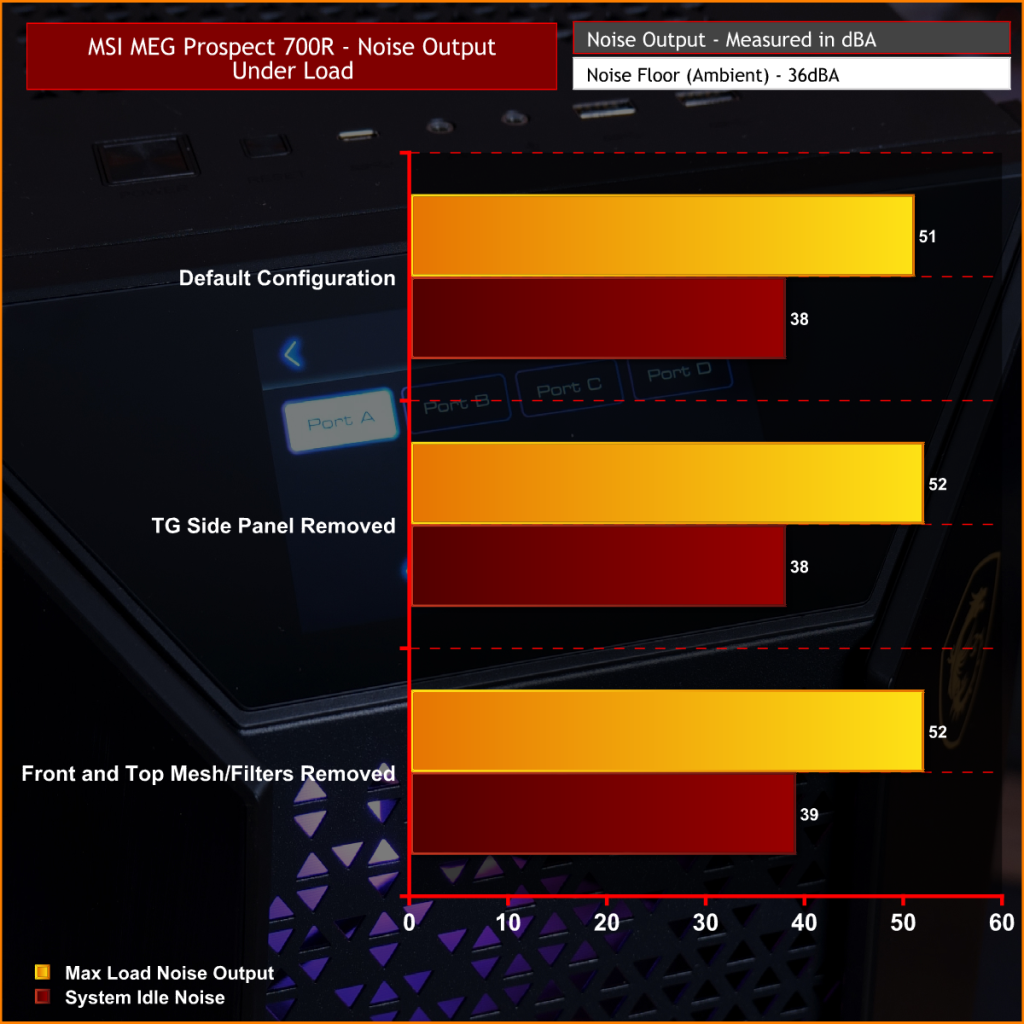
With a CPU temperature of approximately 100°C during stress testing the CPU fans will be running at 100% RPM, which means with this CPU cooler noise output is high. With the case in the default configuration and all panels installed, noise output was measured at 51dBA max. But with the system idle and running the case fans at 40% duty cycle, which was around 800RPM, the system is very quiet so it won't be distracting at all during light load tasks.
Closing Thoughts
If you need a mid-tower chassis with plenty of space for a high-end build with a big graphics card and room for powerful cooling then the MSI MEG Prospect 700R has this in abundance. We found that building a system inside the case was a breeze… except for when it came to testing out the vertical GPU mount, our RTX 4080 just didn’t seem to fit no matter how hard we tried. If you prefer to mount the graphics card horizontally then this won't be a problem.
In terms of build quality, there are no major complaints here either, just a few minor niggles. The case feels very sturdy, the steel that the main chassis frame is built from is thick and the powder coating finish is of a high standard. There is a slight mismatch of black shades between metal and plastic parts but this is quite common in cases that are assembled with different materials, but on a case in this price range you would expect this to be perfect.
Airflow and cooling performance were very strong during our testing and the included MSI 140mm ARGB fans are quiet and provide good airflow through the chassis. Setting the fan speed via the touchscreen panel to 40% duty cycle meant the fans ran at around 800 RPM which is enough to create decent airflow and operation is virtually silent. Thermal performance is excellent too, the mesh front and top panels work well and keep our high-end test system cool.
If you spec your system with the right hardware and cooling equipment you should be able to set up a high-end system that runs cool and quiet. The lack of 420mm radiator support is a bit disappointing especially when it is quite a large mid-tower case, some other similar-sized chassis support 420mm radiators and the need for bigger cooling is more relevant than ever with high-end CPUs consuming so much power.
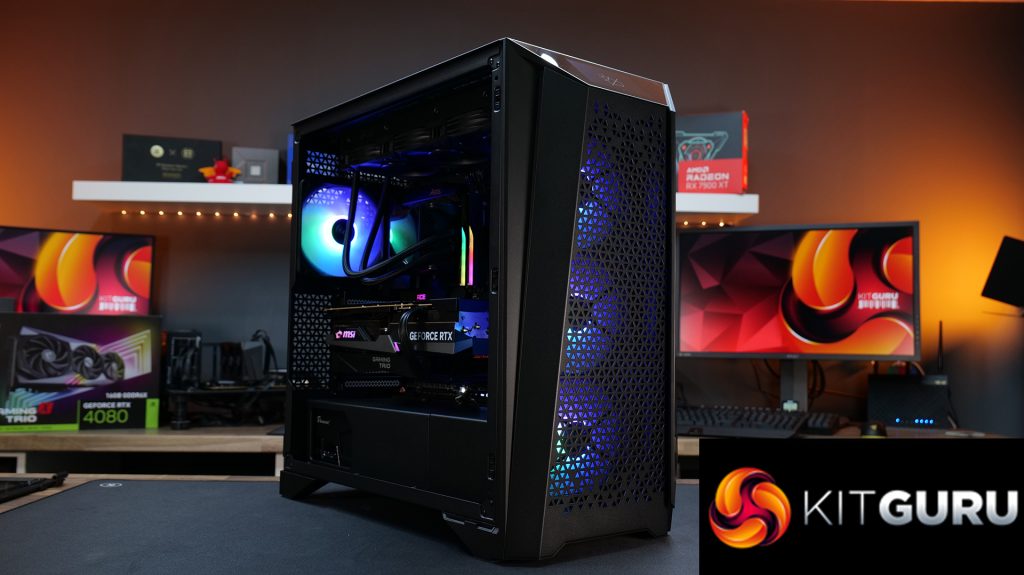
There are a lot of good things about the MSI MEG Prospect 700R such as the build quality, cooling performance, hardware support and the modular panel design that allows users to configure the chassis to their specific needs, but there are some negatives too. As already mentioned we struggled to fit the RTX 4080 vertically with the included mount, and the brushed aluminium panels on the doors are fingerprint magnets. Maybe an alternative material would have been a better choice since these panels are technically used as handles to open the doors.
The MSI Centre software is required to use certain features of the touchscreen LCD panel, and while this isn’t a major issue, the software can be temperamental at times, for instance at one point I lost all connectivity to the AIO. The AIO screen just suddenly vanished from the MSI Centre menu which meant I lost all control of fan speed etc. A quick restart of the system fixed it but it is frustrating when things like this happen.
However, the main problem with the case is the price. If you take the touchscreen out of the equation then the rest of the case features are similar to something like the Corsair 5000D Airflow or Fractal Meshify 2, both of which are priced at around £150. So MSI is effectively asking a £200 premium for the LCD screen which, while a nifty inclusion, does seems a bit much. The screen does offer some useful features but I am not sure it's worth paying this much to have it.
The MSI MEG Prospect 700R is available to pre-order now from OCUK priced at £349.99 HERE.
Pros:
- Good space to build high-end systems.
- System installation is easy.
- LCD touchscreen panel has useful features.
- Modular design is good for various scenarios.
Cons:
- The price is very high.
- Vertical GPU mount compatibility is limited.
- MSI Centre software is required for some LCD functions.
KitGuru says: The MSI MEG Prospect 700R's main feature is the 4.3-inch touchscreen LCD panel which offers some really useful functions and is an excellent way of utilising an LCD screen on a chassis, but is it really worth the £200 premium that MSI has attached to it?
 KitGuru KitGuru.net – Tech News | Hardware News | Hardware Reviews | IOS | Mobile | Gaming | Graphics Cards
KitGuru KitGuru.net – Tech News | Hardware News | Hardware Reviews | IOS | Mobile | Gaming | Graphics Cards


